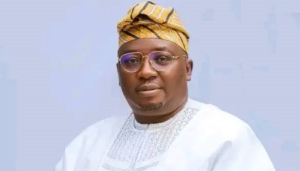Minister of Power, Mr. Adebayo Adelabu, says the Federal Government of Nigeria will soon establish super electricity grid as backup to the national grid that is experiencing incessant collapse.

Adelabu said this while briefing State House correspondents after a meeting with President Bola Tinubu on Monday, October 28, 2024, at the Presidential Villa, Abuja.
According to him, if the national grid has a problem, the super grid will be an alternative route through which power will be transmitted.
He added that regional grids would be established to decentralise the national grid.
“The world has moved beyond having a centralised grid. Grid must be regionalised.
“We must have state grids, so that each of the regionalised grid will be insulated from each other.
“A problem in a particular line will not affect the others. Until that is done, we believe that we’ll keep managing what we have and reduce the frequent occurrence of the grid disturbance,” said Adelabu.
Adelabu explained that the national grid collapsed twice in recent times due to explosion of the transformer at Jeba plant.
He said before the explosion, the last disturbance on the grid, was about four months ago.
“Let me tell you the truth of the matter is we have old infrastructure. We have a national grid that is more than 50 years old.
“We have national grid whose transmission lines are weak, the towers are falling, and the substations, the transformers are old.
“In fact, the transformer that actually exploded in Jeba was 47 years old. We’ve been trying to revamp this, to change them, but they cannot all be changed overnight,” he said.
He said the ministry would continue to manage the grid to prevent frequent disturbances, until it was completely overhauled.
Adelabu also disclosed that the Federal Government was planning to introduce the distributed solar power model in northern states.
“We believe that the most effective way of supplying uninterrupted, electricity to the northern part of Nigeria is through distributed power model, whereby each of the northern states will have an embedded utility, solar source.
“All the states will be insulated and immune from each other, and we have actually made progress on this.
“We have interested contractors and financiers that are ready to install a 100 megawatt for each of the 20 northern states, which is scalable to 50 megawatts at first, then upgraded 100 megawatts.
“When we have this, the power supply to the North will be reliable because of the advantage of the sun that they have, where solar will be highly effective,” said Adelabu.
He said with this scheme, the pressure on the national grid from the northern part of Nigeria would be lower, and Nigerians would be able to enjoy better electricity supply.
“When we talk about a final volume of 100 megawatts for each of the northern states, this includes targeting not just households, we are looking at offices.
“We’re looking at institutions, both health and educational institutions, and we’re looking at industrial clusters that are the major consumers of power.
“We will start from having 50 megawatts for each of the states, which we believe will go around whatever activities that happen in all of the northern states on a state-by-state basis,” he said.
By Salif Atojoko
